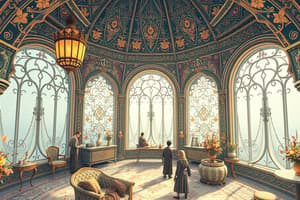Podcast
Questions and Answers
What describes society as it is today?
What describes society as it is today?
- Static and unchanging.
- Only influenced by rural society.
- A result of transitional time periods. (correct)
- Dependent upon agriculture.
What is Classical Organizational Theory primarily concerned with?
What is Classical Organizational Theory primarily concerned with?
The structure of formal organizations and increasing production.
Who is known for advocating scientific management and improving labor performance?
Who is known for advocating scientific management and improving labor performance?
Fredrick Winslow Taylor
What concept did Henri Fayol introduce that contributes to specialization?
What concept did Henri Fayol introduce that contributes to specialization?
What acronym represents the functions of a chief executive according to Luther Gulick?
What acronym represents the functions of a chief executive according to Luther Gulick?
Woodrow Wilson believed public administration should be studied theoretically.
Woodrow Wilson believed public administration should be studied theoretically.
What did Weber identify as characteristic of bureaucracies?
What did Weber identify as characteristic of bureaucracies?
Flashcards are hidden until you start studying
Study Notes
Introductory Statement
- Society has evolved through various transitional periods, impacting culture, technology, and industry.
- Stability and production balance remain essential despite societal changes.
- Organizational theory emerged as guidance for managing large-scale organizations.
- Theoretical frameworks are distinct and responsive to historical contexts.
Classical Organizational Theory
- Foundation for modern organizational perspectives, originating in response to the Industrial Revolution during the 1700s.
- Dominated organizational thought until the 1930s, influenced by the industrial era's characteristics.
- Individuals perceived as components of an industrial machine, rather than unique entities.
- Scientific inquiry aimed at optimizing production efficiency addressed complexities of factory organization.
- An emphasis on formal organizational structure and economic production goals led to the creation of the first organizational chart and specialization of labor.
Frederick Winslow Taylor (Classical)
- Advocated for scientific management to discover efficient labor practices.
- Promoted scientifically selecting and training workers to enhance performance and productivity.
Henri Fayol (Classical)
- Introduced the division of labor, leading to specialization.
- Emphasized the necessity of authority, discipline, and a clear organizational hierarchy for business prosperity.
- Proposed that scientific management improves productivity and benefits society by enabling increased mass consumption.
Luther Gulick (Classical)
- Built upon Fayol's principles and introduced the POSDCORB acronym, representing planning, organizing, staffing, directing, coordinating, reporting, and budgeting as key executive functions.
- Analyzed span of control and unity of command in organizational structure.
- Suggested that administration and politics cannot be separated.
Woodrow Wilson (Classical)
- Advocated for practical studies in public administration to enhance government efficiency.
- Emphasized the duty of public administrators to optimize federal organizations with minimal resources and maximum effectiveness.
Max Weber (Classical)
- Utilized an "ideal-type" model to identify characteristics of bureaucratic organizations.
- Recognized bureaucracies' hierarchical structure, where authority flows downward while accountability moves upward.
- Work is organized into specialized units based on skills, with uniform recruitment practices and equitable treatment for employees and customers alike.
Studying That Suits You
Use AI to generate personalized quizzes and flashcards to suit your learning preferences.




